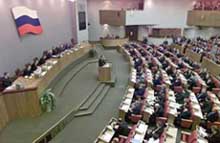 |
 |

The new Russian State Duma or the lower house of parliament of the third convocation elected in the polls on December 19, 1999 held its first plenary session Tuesday, opening its work at an official ceremony of confirmation of the lower chamber. The house has 441 members, 225 of whom were elected on party tickets and have already formed factions, such as the Communist Party, the Unity bloc, the Fatherland-All Russia coalition, the Union of Right-Wing Forces, the Zhirinovsky bloc and the Yabloko movement. The rest deputies were elected on the first-past-the-post principle. The elections were not successful in nine constituencies, mainly because more voters cast their ballots against all candidates than for any one candidate. The new polls have to be held in these constituencies in spring. Addressing the new State Duma, acting Russian President Vladimir Putin advocated a consolidated and more effective parliament, urging lawmakers to step up their work on priority federal laws "without procrastination." "The policy of struggle and political ambitions should be brought to an end, and a transfer should be made to a policy of cooperation and self-restriction," Putin said. The new Duma should mark a new stage in the Russian parliament's work, said Putin, noting that an example of efficient cooperation between the executive and legislative branches was setin the second half of last year. "The new Duma can count on constructive and open cooperation with the executive branch. As an acting president, I am prepared to extend comprehensive assistance to parliament," he said. "We donot intend to split the deputies into ours and someone else's. We expect broad support in the Duma," he said. In keeping with tradition, the oldest deputy from each faction and the main groups of deputies will take turns to preside over the first plenary session of the new Duma. Seventy-nine-year-old Yegor Ligachev, ex-member of the Central Political Bureau of the former Soviet Union Communist Party, is the eldest among the lowerhouse members, chaired Tuesday's plenary session. The session is expected to elect the house's leading bodies on the opening day. The house will elect its speaker, his deputies and chairmen of the house committees. The Communist Party and the Unity movement are the largest in the new State Duma, occupying 113 and 95 seats respectively. The Fatherland-All Russia alliance and the Union of Right-Wing Forces control a relatively large number of seats and thus votes (46 and 29), while the Yabloko and Zhirinovsky blocs have the least seats of 20 and 17. In general, the new Duma has 35 female members. In addition, new groups of deputies are emerging in the Duma, such as the People's Deputy group, the Russian Regions group and the Agrarian group. (Xinhua) |
Please visit People's Daily Online --- http://www.peopledaily.com.cn/english/